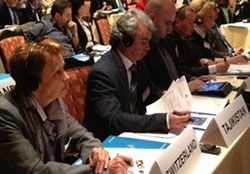Reigniting economic growth and reducing unemployment are good health policy

WHO/Melitta Jakab
Senior government officials reached broad agreement on the policy responses needed to address the health impact of the economic crisis, during discussions at a high-level meeting in Oslo, Norway on 17–18 April 2013.
Despite a macroeconomic outlook with very low growth for most of the WHO European Region, resulting in restricted fiscal space and limitations on health spending, governments can still choose where to allocate funds. Participants said that the focus should be on areas and services that encourage economic growth and that reinforce solidarity and equity (such as health, unemployment, social benefits, and education). Experts agreed that fiscal balance has to be restored in the medium term, but this does not necessarily require cuts in health and social spending during the crisis, when needs for these services rise.
The evidence available indicates that the crisis has had a negative impact on important health outcomes and health determinants, and (although further scientific and policy analysis is needed) health ministers must be part of the negotiations on macroeconomic policies, social policies and even austerity measures.
Crisis as opportunity for health reform
Most countries have used the crisis as an opportunity to implement overdue reforms in health policy, aimed at increasing efficiency while preserving equity and protecting the poor and vulnerable. Participants identified key elements of these reforms, including:
- focusing on disease prevention and health promotion;
- strengthening primary health care to improve service delivery;
- updating pharmaceutical policies to focus on cost–effectiveness to reduce inefficiencies and increase the use of generic medicines; and
- streamlining benefit packages.
Despite pressure to introduce and increase user fees in many countries, participants labelled them the “sledgehammer” of health financing reform: both inefficient and inequitable. They agreed that other instruments should be used, even in crises and even when savings are made at a slower pace.
Policy recommendations in development
WHO/Europe organized the meeting to review the impact of the global economic crisis on health and health systems in the Region, discuss the various policy responses, share lessons learned and agree on ways in which countries can better prepare for the future. WHO/Europe will consult with Member States to develop a series of policy recommendations based on the discussions, to be submitted for endorsement to the sixty-third session of the WHO Regional Committee for Europe in September 2013.



